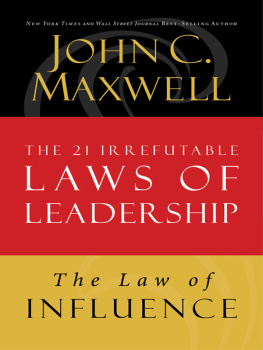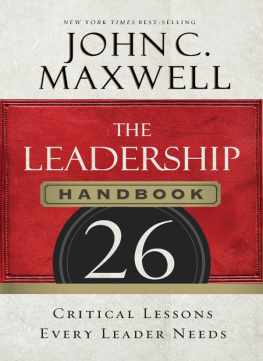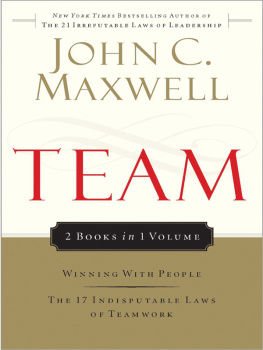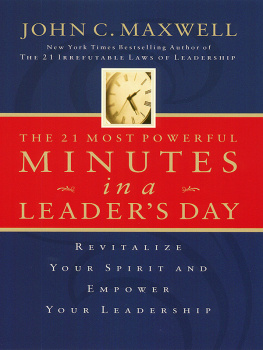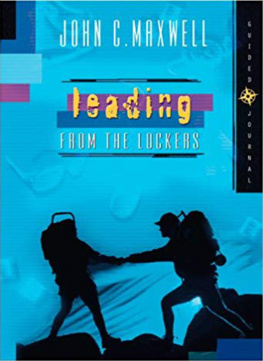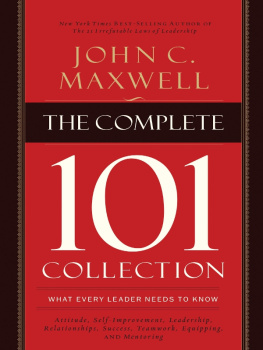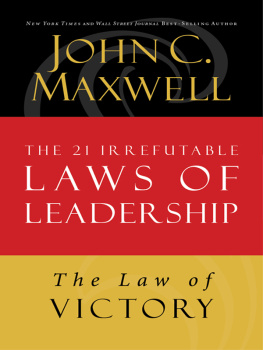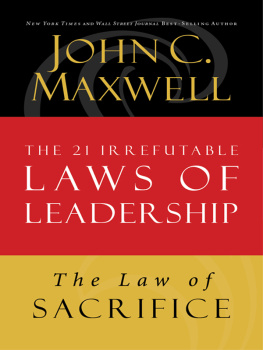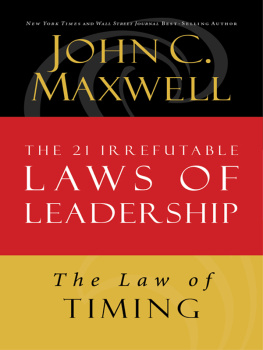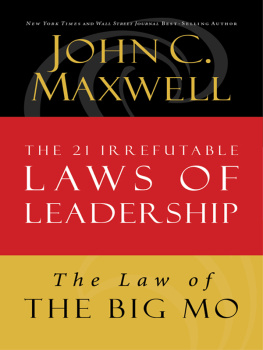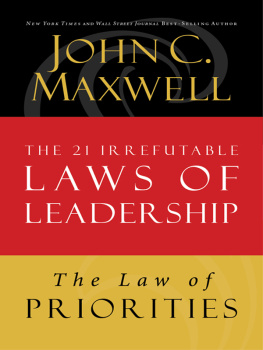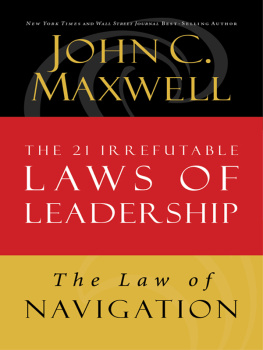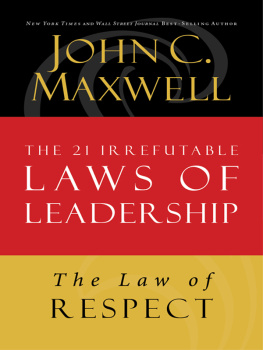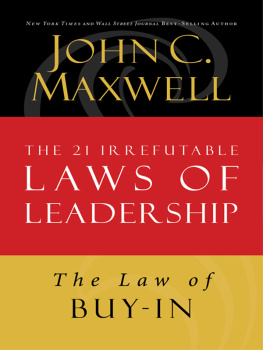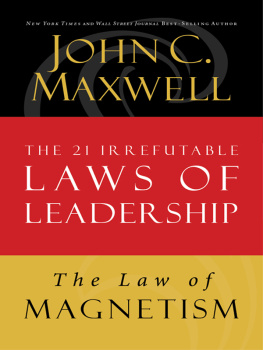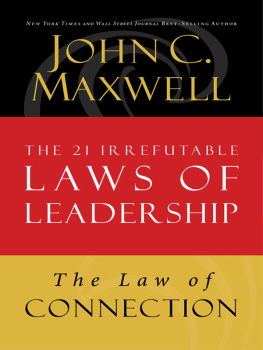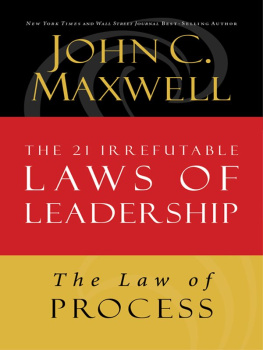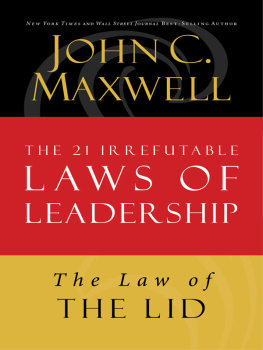
1998 and 2007 by John C. Maxwell
This ebook is derived from The 21 Irrefutable Laws of Leadership, by John Maxwell, 1998 and 2007 by Maxwell Motivation, Inc., a Georgia corporation.
All rights reserved. No portion of this book may be reproduced, stored in a retrieval system, or transmitted in any form or by any meanselectronic, mechanical, photocopy, recording, scanning, or otherexcept for brief quotations in critical reviews or articles, without the prior written permission of the publisher.
Published in Nashville, Tennessee, by Thomas Nelson. Thomas Nelson is a trademark of Thomas Nelson, Inc.
Thomas Nelson, Inc. titles may be purchased in bulk for educational, business, fund-raising, or sales promotional use. For information, please e-mail SpecialMarkets@ThomasNelson.com.
Published in association with Yates & Yates, LLP, Attorneys and Counselors, Orange, California.
Scripture quotations noted CEV are from THE CONTEMPORARY ENGLISH VERSION.
1991 by the American Bible Society. Used by permission.
Scripture quotations noted The Message are from The Message: The New Testament in Contemporary English. 1993 by Eugene H. Peterson.
ISBN 978-0-7852-7431-5 (HC)
ISBN 978-1-4185-3831-6 (ebook)
ISBN 978-1-4002-7561-8 (ebook of Chapter 2)

This book is dedicated to Charlie Wetzel, my writing partner since 1994. Together weve written more than forty books, and Ive enjoyed our collaboration on every one. As I have labored to add value to others by identifying and teaching leadership principles, Charlie, you have added value to me and my efforts. Your insights and skills as a wordsmith have been enjoyed by millions of readers. As a result, you have made a greater impact on more people than has anyone else in my inner circle. For that I thank you.
CONTENTS


Thank you to the thousands of leaders around the world who learned and sometimes challenged the laws of leadership, thus sharpening my thinking.
Thank you to the team at Thomas Nelson who gave me the chance to revise and improve this book, and especially to Tami Heim for her strategic leadership and to Victor Oliver who was instrumental in the development of the original concept.
Thank you to Linda Eggers, my executive assistant, and her assistant, Sue Caldwell, for their incredible service and willingness to go the extra mile every day.
Thank you to Charlie Wetzel, my writer, and Stephanie, his wife, with-out whose work this book would not have been possible.

The True Measure of Leadership Is
InfluenceNothing More, Nothing Less
What do leaders look like? Do they always look powerful, impressive, charismatic? And how do you measure the effectiveness of a leader? Can you put two people side by side and instantly tell which is the better leader? These are questions people have asked for hundreds of years.
One of the most effective leaders of the late twentieth century was anything but impressive upon first appearance. When most people think of Mother Teresa, they envision a frail little woman dedicated to serving the poorest of the poor. That she was. But she was also a tremendous leader. I say that because she had an amazing amount of influence with others. And if you dont have influence, you will never be able to lead others.
SMALL STATUREBIG IMPACT
Lucinda Vardey, who worked with Mother Teresa on the book The SimplePath, described the nun as the quintessential, energetic entrepreneur, who has perceived a need and done something about it, built an organization against all odds, formulated its constitution, and sent out branches all over the world.
The organization Mother Teresa founded and led is called the Missionaries of Charity. While other vocational orders in the Catholic Church were declining, hers grew rapidly, reaching more than four thousand members during her lifetime (not including numerous volunteers). Under her direction, her followers served in twenty-five countries on five continents. In Calcutta alone, she established a childrens home, a center for people with leprosy, a home for people who were dying and destitute, and a home for people suffering with tuberculosis or mental disorders. That kind of organizational building can be accomplished only by a true leader.
Mother Teresas impact reached far beyond her immediate environment. People from all walks of life and from nations around the globe respected her, and when she spoke, people listened. Author and former presidential speechwriter Peggy Noonan wrote about a speech Mother Teresa gave at the National Prayer Breakfast in 1994. It illustrates her level of influence with others. Noonan observed:
The Washington establishment was there, plus a few thousand born-again Christians, orthodox Catholics, and Jews. Mother Teresa spoke of God, of love, of families. She said we must love one another and care for one another. There were great purrs of agreement.
But as the speech continued, it became more pointed. She spoke of unhappy parents in old peoples homes who are hurt because they are forgotten. She asked, Are we willing to give until it hurts in order to be with our families, or do we put our own interests first?
The baby boomers in the audience began to shift in their seats. And she continued. I feel that the greatest destroyer of peace today is abortion, she said, and told them why, in uncompromising terms. For about 1.3 seconds there was silence, then applause swept the room. But not everyone clapped; the President and First Lady [Bill and Hillary Clinton], the Vice President and Mrs. Gore looked like seated statues at Madame Tussauds, moving not a muscle. Mother Teresa didnt stop there either. When she was finished, there was almost no one she hadnt offended.
At that time if just about any other person in the world had made those statements, peoples reactions would have been openly hostile. They would have booed, jeered, or stormed out. But the speaker was Mother Teresa. She was probably the most respected person on the planet at that time. So everyone listened to what she had to say, even though many of them violently disagreed with it. In fact, every time that Mother Teresa spoke, people listened. Why? She was a real leader, and when the real leader speaks, people listen. Leadership is influencenothing more, nothing less.
LEADERSHIP IS NOT...
Leadership is often misunderstood. When people hear that someone has an impressive title or an assigned leadership position, they assume that individual to be a leader. Sometimes thats true. But titles dont have much value when it comes to leading.
True leadership cannot be awarded, appointed, or assigned. It comes only from influence, and that cannot be mandated. It must be earned. The only thing a title can buy is a little timeeither to increase your level of influence with others or to undermine it.
FIVE MYTHS ABOUT LEADERSHIP
There are plenty of misconceptions and myths that people embrace about leaders and leadership. Here are five common ones:
Next page
